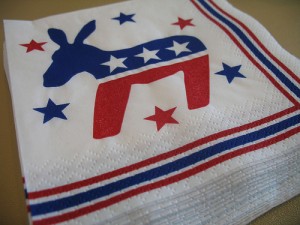 Unions and Democratic Party politicians are infamously loyal to one another. Labor PACs consistently send about 90 percent of their contributions to Democrats—even as roughly 40 percent of union households consistently vote Republican—and Democrats supply labor favors in return. But when labor and Democrats disagree, unions can savage their allies as brutally as they would a labor-reform-minded Midwestern governor.
Unions and Democratic Party politicians are infamously loyal to one another. Labor PACs consistently send about 90 percent of their contributions to Democrats—even as roughly 40 percent of union households consistently vote Republican—and Democrats supply labor favors in return. But when labor and Democrats disagree, unions can savage their allies as brutally as they would a labor-reform-minded Midwestern governor.
The current source of consternation between Democrats and labor are a series of free trade bills supported by erstwhile labor favorite President Barack Obama. While many Democrats are noncommittal on the “Trade Promotion Authority” measure that would allow President Obama to negotiate a Pacific free-trade deal and submit a bill for an up-or-down vote, labor is playing hardball—including suspending its campaign contribution program until the bill is defeated—to block it. Labor has also begun running television ads targeting trade-supporting Democrats, most notably Ami Bera of Sacramento—who took over $160,000 in contributions from labor in his 2014 reelection.
The aggressiveness of unions’ attacks on the trade front has Democratic Representatives very angry at their usual allies. Rep. Cedric Richmond, a Democrat from New Orleans, told CNN: “Labor is going a little overboard and I think there is some potential backlash for how far they are going.” Chicago Rep. Mike Quigley was even harsher, noting, “If you just look at [Trade Promotion Authority] from a rational view, you’d have a lot more yeses.”
Labor’s desperation illustrates the problem that unions’ self-isolation in the political universe has caused. By cultivating support almost exclusively from one party, unions made themselves the Democrats’ “cheap date” that can be easily ignored when another coalition party demands satisfaction.
That doesn’t mean that elected Democrats are necessarily out of the woods: Labor has made self-destructive efforts to ensure Democrats’ absolute loyalty before. In 2010, then-Senator Blanche Lincoln, who opposed the card-check bill that labor made a litmus test, faced over $3 million in SEIU attacks on behalf of primary challenger Bill Halter. While Lincoln beat back the challenge, labor’s spiteful attacks depleted her resources and left her hopeless in the general election against Republican John Boozman, who ended up unseating her by 21 points.



